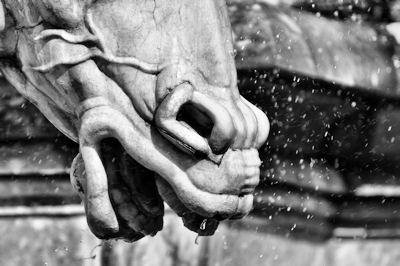 In the early ’80s, I would make drug runs to New York City in my dented blue Nova. I drove from a small town in Pennsylvania at my friend’s request. I felt superior to my friends in a way that can only come from being the single person in a crowd of like-minded people to own an automobile. The trips took most of the day and often a good bit of the night. One trip to the Bronx, my friends locked themselves into the bathroom of an apartment and wouldn’t come out. Tired of waiting for them, I went downstairs to the corner bodega and then hung out by my car. The sky was overcast and grey, the engine still warm from the interstate. A guy I recognized from the house asked me if I’d give him a ride into Manhattan. He promised drugs. I didn’t see how it could hurt, so I said okay and then suddenly a group of people piled into my car. I felt a little uncomfortable, but decided to roll with it.
In the early ’80s, I would make drug runs to New York City in my dented blue Nova. I drove from a small town in Pennsylvania at my friend’s request. I felt superior to my friends in a way that can only come from being the single person in a crowd of like-minded people to own an automobile. The trips took most of the day and often a good bit of the night. One trip to the Bronx, my friends locked themselves into the bathroom of an apartment and wouldn’t come out. Tired of waiting for them, I went downstairs to the corner bodega and then hung out by my car. The sky was overcast and grey, the engine still warm from the interstate. A guy I recognized from the house asked me if I’d give him a ride into Manhattan. He promised drugs. I didn’t see how it could hurt, so I said okay and then suddenly a group of people piled into my car. I felt a little uncomfortable, but decided to roll with it.
Somewhere in Manhattan I dropped everyone off but this one woman, who stayed with me as I circled the block. I was unfamiliar with driving in the city, particularly where it came to pedestrian right-of-way. The woman clucked nervously and then hid her face—long delicate fingers, touching her high brow—as pedestrians glared. When all the guys piled back into the car, the woman pointed out my driving deficiencies to the man in the front seat.
“He can’t drive,” she said.
At first, this man took my back. He claimed that it was often a better strategy not to drive too pretty. Then I made a right-hand turn, nudging through some more pedestrians in a crosswalk, and he decided he had better drive after all. He asked me to let him behind the wheel, and I balked. Drive my car? He tried to intimidate me by showing me a gun tucked into his pants, but I was nervous about driving in the city and didn’t catch on. He eventually pulled the gun out of his waistband and scratched his nose with the barrel. I pulled over and by then all the guys had pulled out their guns and were hooting and hollering. I got in the backseat. Soon someone started talking about “the body” and “what to do with the body.” I couldn’t follow the conversation, but at some point I realized that the body they were discussing was my own.
Making another stop, they left me and the girl alone in the back seat.
I felt like the girl was my one good hope. In the glove box I had some pictures of my wife and me from our recent wedding. My plan was to show the girl these pictures, in the hope that she might intercede with the men, preventing them from shooting me. As I leaned into the front seat to get the pictures, she started yelling at me and fumbling in her purse. I got the pictures, sat back in my seat, and turned to show them to the girl, who by now had edged as far back into the corner of her seat as possible, and was holding with both hands a small caliber gun. She lowered her weapon and sighed. She blew heavily from her mouth, the way you might if your body just filled with a large amount of adrenalin that you now no longer required.
I didn’t know what to say, so I just started showing her the pictures in my small voice: “This is me. And that’s my mom. This is my little brother.”
When the men got back, the woman moved up to the front, never mentioning our little standoff. I felt shamed and foolish sitting between the men in the back seat. I had no idea that they would all have guns, especially the woman. Had no idea that they were kidding with that talk about the body. I would need a bit more time—December 1988 to be exact—to grasp that drugs were wrong for me. But whether in an instant or with reflection, it’s always sobering to realize that you have miscalculated so much, on so many levels.
I was at least right about that woman being able to control those men: When they got back into the car and returned to the joke about the body, she told them to shut up.
And they did.
—
Tim Elhajj’s work has appeared in, or is forthcoming from, Sweet, Guernica, The Yalobusha Review, Brevity, The New York Times and others. He co-edits Junk, a nonfiction literary magazine that focuses on addiction. His first memoir, tentatively titled Dopefiend, is forthcoming from Central Recovery Press in September 2011.
Photo by Dinty W. Moore
